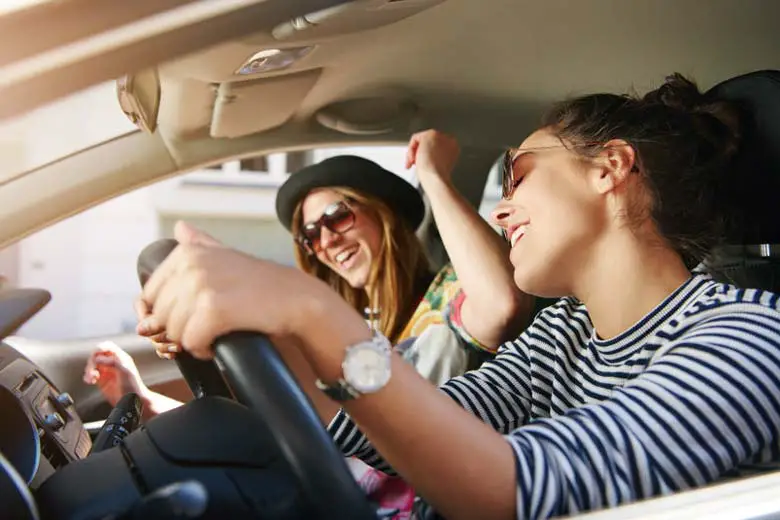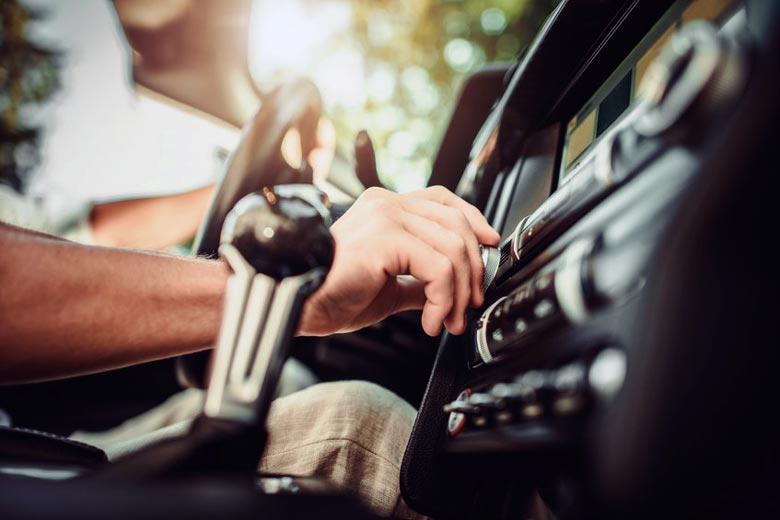Music does wonders to take the stress out of driving. Whether cruising on the highway or stuck in traffic, listening to your favorite tunes makes driving feel less like a chore. However, given how loud car stereos can get and the amount of time we spend behind the wheel, does listening to music in the car damage our hearing?
Car speakers can damage your hearing. Car speakers can reach more than 85 dB (decibels), which will harm your ears. Still, even if you don’t play the music that loud, prolonged exposure can also cause hearing loss. Try to keep music at the same level as a normal conversation to keep it safe.
So, let’s talk more about how your car speakers can impact your hearing. I’ll explain when your car speakers are too loud and give you tips on enjoying your car’s audio without losing your hearing.

How Car Speakers Damage Your Hearing
There are around 16,000 hair cells in our cochlea or inner ear, which convert sound vibrations to electrical signals for our brain to process. These hairs move around as sound passes through our ears, and they can get damaged when overworked.
Some hair cells can repair themselves after a recovery period, but excessive loud noise or prolonged exposure can damage them.
Hence, exposure to loud sounds can cause temporary or permanent hearing loss.
Sound at 70dB or below is generally considered safe. Anything above 85dB can be harmful to our ears. To put things into perspective, doorbells, ringing phones, and alarm clocks typically measure 80dB.
Car sound systems can reach 90 to 130dB. You can measure a speaker and amplifier’s power output in watts, and the higher the wattage, the louder the speaker gets.
Loudness will vary depending on the speaker’s sensitivity rating, but a car with a relatively conservative power rating of 30 watts per speaker can quickly produce a sound that breaches 100dB.
Imagine how much louder the more extravagant systems can get if a run-of-the-mill car audio system with a factory head unit and a speaker in each door can make this much noise.
High-end or aftermarket audio systems have power ratings in the hundreds, if not thousands of watts, especially those with numerous speakers, subwoofers, and amplifiers.
Knowing how loud car audio systems can get makes it easy to understand how they can damage hearing. However, loudness isn’t the only noise factor that causes hearing loss.

Keeping Your Ears Too Close to the Speakers
Another factor that affects hearing loss is the distance between your ears and the sound source. Sounds get louder as you move closer to the output. So, being too close to the speaker risks your ears.
Many car speakers are on the lower part of the doors. However, some cars have speakers near the rear windshield on the backboard, putting the audio output mere inches away from any occupants sitting in the back seat.
Be mindful of anyone sitting in the back seat or close to your car’s speakers, and lower the volume accordingly.
Listening to Music for Long Periods
Even if you keep your car stereo at a relatively moderate noise level, you can still suffer from hearing loss by listening to music for long periods.
The more time we spend listening to music, the greater the risk of hearing loss since it can overwork the hair cells in our ears.
Hence, someone who listens to music in their car at 80dB for two hours is as likely to damage their hearing as someone who listens to music at 120dB for fifty minutes.
Here’s a table that shows the relation between hearing loss, time, and loudness.
| Loudness (dB) | Example | Time taken for possible hearing loss to occur |
|---|---|---|
| 70 and below | Whisper, Dishwasher, Refrigerator | Safe level |
| 70-80 | Coffee grinder, Freeway traffic | Annoying level |
| 80-85 | Lawnmower, Hand saw, Blender | 2 hours |
| 95 | Electric Drill, Motorcycle | 50 minutes |
| 100 | Car horn, Factory Machinery | 15 minutes |
| 110 | Bar, Music club, Power saw | 2 to 5 minutes |
| 120 | Rock concert, Jet on tarmac | Less than a minute |
Use this table as a reference, especially if you spend hours a day listening to music in your vehicle.

The Cadrim Decibel Meter (available at amazon.com) has a measuring range of 40 to 130dB and is good to have since it’ll let you know if the music you’re listening to is too loud.
You can download free decibel meter apps, but they only have a maximum measuring range of 90dB, which most car speakers can exceed.
Other Adverse Effects of Loud Car Audio
Hearing damage isn’t the only risk of listening to loud music in your car.
The urge to crank the volume up may be hard to resist, especially given how music generally puts us in a good mood. However, some studies indicate it can do quite the opposite and may even hamper our driving performance.
One such study involved having 85 young novice drivers complete six trips in an instrumented Learners Vehicle. The test revealed that all the drivers were more prone to committing driving deficiencies when their preferred music was playing.
Many of them needed a verbal warning and, in some cases, steering or braking intervention from the instructor to prevent an accident.
Other studies show that playing loud music while driving can cause driver distraction and delay reaction time.
Not being able to react immediately to your surroundings severely decreases your chances of avoiding an accident.

How To Protect Yourself From Car Speaker Hearing Damage
The best way to preserve your hearing is to avoid loud noise or prolonged exposure to it. However, that doesn’t mean turning your back on car audio altogether. There’s still value in getting a car with a good quality audio system.
You can still enjoy music while driving without damaging your hearing.
Learn To Appreciate Audio Quality Over Sheer Loudness
A pleasant listening experience does not have to rely on excessive loudness. There are so many attributes of audio that will allow you to enjoy your car’s stereo at a safe volume.
A decent audio system doesn’t just play music louder. It also enhances the listening experience by delivering better sound with low distortion, a comprehensive frequency response, and a broad dynamic range.
If you learn to appreciate these qualities in a sound system, you won’t always have to turn the volume up.
Keep a Safe Distance
There’s not much you can do to keep a safe distance from your car speakers since the speakers and your seats are bolted down.
However, you can adjust the balance and fader on your car stereo to decrease the speakers’ volume closest to you.
Some modern car audio systems can automatically adjust the balance and fader depending on which seats have passengers.
Limit Your Exposure
Another way to reduce the risk of hearing damage is to limit your exposure to loud sounds. Our ears may be sensitive to noise, but you’ll find that they hold reasonable thresholds in terms of how long they can be exposed to sound before any damage occurs.
Be mindful of the amount of time you spend in your car because that gives you an idea of how loud you can play your music before potentially damaging your hearing.
Naturally, if you stay in your car longer than usual due to a more extended trip or heavy traffic, you need to lower the volume of your music.
The Verdict
Generally speaking, exposure to loud noise can damage your hearing. Given how loud car audio systems are, the amount of time we spend in the car, and how confined their interiors are, we can conclude that listening to music in our vehicles ticks all the factors that can lead to hearing loss.
However, we can still enjoy music in our cars by taking the necessary precautions and learning to appreciate quality over intensity.
